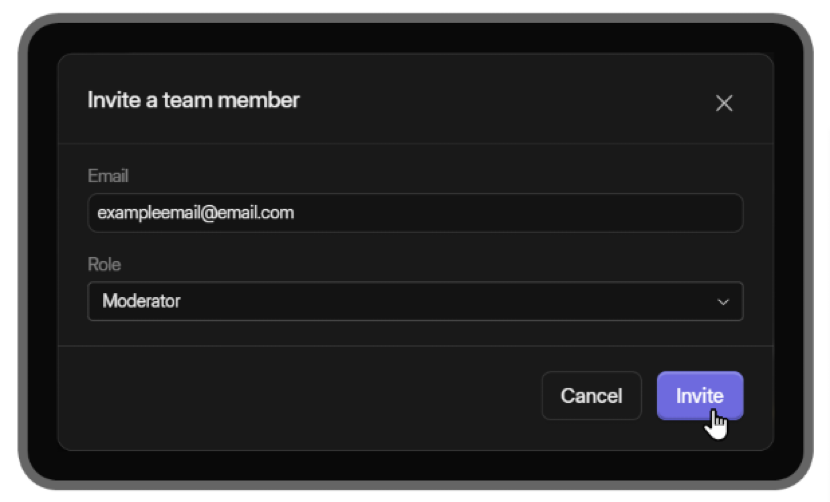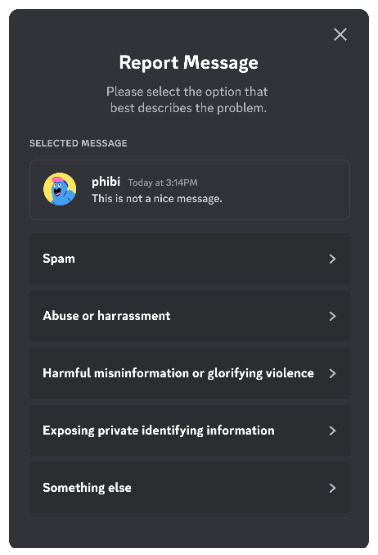Tips for successful community moderation include laying out clear guidelines, listening to the members of your group, and regular monitoring. Here's how to get started.
Key takeaways
- Clear, accessible community guidelines that define acceptable behavior and consequences are the foundation of effective moderation.
- Balance moderator presence by sparking conversations daily without dominating discussions or over-promoting paid content.
- Combine human moderators for nuanced judgment with AI tools for 24/7 monitoring to scale moderation effectively.
Community moderation involves finding the right platform that gives you all the tools you need, laying out clear guidelines for your members to follow, monitoring, and answering questions.
That's it in a nutshell, but the reality is a lot more involved. If you want to run a successful community, you'll need to give it some thought.
The upside? It's incredibly rewarding. Whether you're a local book group looking to go digital or a business wanting to connect with your customers, online communities can help you have insightful conversations and share important resources, but only if they're moderated.
So, here, we set out 7 steps to easy online community moderation – so you can focus on growing your business and supercharging your revenue.
7 steps to successful online community moderation
1. Set out your community guidelines
The first thing to do is develop a set of guidelines for members to follow. Think of it as a clear, to-the-point list of things to do (and more importantly, not to do).

Simply set out what’s acceptable and what will happen to users and content deemed unacceptable. The penalties for posting unacceptable content might include a “don’t do it again”-type warning or “three strikes” policy.
It’s important to reserve the right to kick people out of the community for repeated or serious transgressions (possibly with a partial refund if they’re a paid member).
One of the most important things the guidelines should do is ban the posting of offensive content.
What is “offensive” content?
While the term can mean different things to different people, the main types of content generally considered “offensive” include:
☠️ Sexually explicit or pornographic material
☠️ Anything that encourages violence or self-harm
☠️ Threats and bullying
☠️ Material related to criminal activity
☠️ Content related to child abuse
☠️ Discriminatory language
☠️ Rude comments
However, beyond the obvious, there are some gray areas about which you will need to decide.
For example, what about profanity? Extreme political views? Harmless conspiracy theories? Yup, all of that falls under community moderation, and figuring this out is key to successful community management.

You want to strike a balance between letting conversations play out, but ensuring the community is a welcoming (and inclusive) space.
Other things to cover in your community guidelines are:
✅ Aim of the community (what can users expect?)
✅ Rules on usernames
✅ Age restrictions
✅ Primary language/s used (so all members can participate)
✅ Target user base (beginners, experts, all levels, etc.)
✅ How members can provide feedback
✅ Separate rules for each channel or space (if applicable)
✅ Policy on spam
✅ Penalty system
✅ Data protection/privacy
✅ Acceptable content in posts (links, video, etc.)
✅ Policy on AI-generated content
✅ Policy on promotion and selling
Depending on the type of community and the age range of the members, you might want to add other things to cover your specific requirements.
Here’s an example taken from the rules related to the Python Discord server:

While this might all sound like a lot, you can (and should) keep the guidelines brief and easily readable. Lengthy guidelines may not be read in full and might even turn some potential members off to the point that they don’t join.
2. Make the rules easily available
Once you’ve put together your guidelines, make sure they’re easily accessible for members to read.
Post them on a separate page with a clear heading. Also, consider introducing a way for new members to view and agree to the guidelines before they can access the community, such as a tick box.
With Whop, you can add this as an option to each new product. Just tick "Ask questions before checkout" to be able to vet your future members.

Don’t forget to include a section on the moderation policy. For example, the Python Discord server includes the following:

If you change the guidelines in any way, people have to know, so shoot them a message in your community or via other means.
3. Decide who will moderate the community
When you first launch your community, you may be able to handle the moderating yourself.
But as it gets bigger and bigger, you'll slowly run out of time to monitor it all by yourself.
No stress – that's a sign of success. Save yourself time and focus on scaling your business, and let others moderate your community at that point.
When running a community, your main focus will be to teach others, and moderating will start eating up too much of your time. As explained by Volky below, if you've got skills to share, teach them – it's a better way to make money.
"If you're in a career and you've been doing that career for a long time, the next logical step is always going to be to teach others how to do what you do and create an additional source of income for yourself.
Platforms like Whop are really great because it takes your existing skills and lets you monetize those skills. It's definitely the next logical step."
— Volky, Digital Nomad Community
So, how do you pick a good mod for your community and save all your time for something else?
First of all, your mod will have to be ready to enforce the guidelines, and might even need to vet future members. It has to be someone who can be firm, but is always friendly and approachable. You don't want them scaring people off.

For more established communities, existing members with a strong track record are often invited to become moderators. This can be a good idea as they already enjoy being part of the community and interacting with other members.
Make sure you vet their posting history before you give them moderator permissions on your site.
On Whop, you can invite team members and give them permissions above an average users, effectively turning them into mods.
4. Monitor the community regularly
How much time moderation takes will depend on the size of the community. A few hours a day may be fine for smaller communities. Larger communities with multiple channels might have several moderators covering shifts all day (and overnight).

Monitoring means more than just skimming over the comments to look for offensive content. It means keeping an eye on the conversation and being ready in case things start getting heated.
It’s also a good way to measure engagement with the community – if the moderator finds they rarely have to step in, it shows that the members are interacting positively. So, if they're talking and it's mostly good, then you're doing a great job.
As well as looking at what people write, check the links, images, videos, and anything else they post. Be especially alert to things posted by new members.
Moderators also answer questions posted by members and enforce the guidelines.
5. Pay attention to member feedback
This is an important role of the moderator. Ultimately, the community exists for the benefit of the members, who you hope will become paying customers.
So, practice good member relations by taking on board any feedback. Not all comments will have merit. People might just have a personal gripe about another member or want to rant about having a post removed.
However, member feedback might flag problematic content or behavior that you or your moderator may have missed.

Make it easy for members to send you and the mod team a report, and show them how to reach out to you with questions and feedback.
6. Don’t take over the conversation
While moderators should have a presence in the community and step in when needed, they shouldn’t dominate. The role is mainly to monitor the activity and look for signs that things are going off track.
On the other hand, it helps to keep people talking, so it's good to send a conversation starter every day, says Lucas Duncan from Whop.
"Inside your Whop, it's super important to keep the energy flowing. The easiest way to do this is by dropping a question or a quote at the beginning of each day.
Drop that in the chat, that's going to get members active and engaged. From there, it's going to raise the time spent in your whop."
- Lucas Duncan from Whop
You just don't want to be the only person talking. (For that, just host a live event or a Q&A instead.)
Mostly, moderators should stay low-key. Show up to answer questions and get the conversation moving, but unless someone’s violating the rules, let interactions and discussions play out.
7. Avoid over-selling
Even if you plan to monetize your community, using every opportunity to push your paid services and content is not a great idea.
Members are likely to be put off if you interrupt conversation threads with promotions and links to make purchases. It’s also kind of a double standard if your guidelines ban members from promoting their own stuff.
That doesn’t mean you can’t leverage your community to generate revenue. There are plenty of ways to monetize a community, including:
💰 Paid memberships: A common way to monetize a community is to offer paid access, either as the only option or as a premium add-on to a free community.
💰 Offer relevant coaching or courses: Communities lend themselves to lots of related educational content, such as e-learning resources.
"College kids are making a significant amount of money showing the older generation how to use technology — specifically AI and social media."
— Online tech coach and business owner
💰 Create a paid newsletter: Whatever your niche, you can publish a paid newsletter that includes insights and other relevant content.
8. Automated online community moderation
This article assumes that you will be using human moderators for your online community. However, AI is becoming a solid alternative.
AI bots and auto moderators are trained to spot certain words and immediately take action.
Some are more sophisticated. When you make your own whop, you can add a bunch of AI apps that can handle a lot of moderating for you.
For example, AI Chat can serve as a custom support bot and coach. Meanwhile, Coach AI can be trained on your own content to help your community when you're busy.

The advantages of this include peace of mind that your community is being monitored consistently 24/7. You can also tailor the moderation to be alert for different types of content in multiple languages.
The disadvantages include that you lose the human element, which is sometimes important. AI-powered moderators might misinterpret and flag specific words that are taken out of context, for example. This might lead to community members being unfairly penalized. They might also miss things that a human moderator would spot.
If you want to explore this option, some platforms that offer automated moderation are:
- Arwen
- Ettiq
- Utopia AI Moderator
- CommentGuard
- Besedo
The services vary, with some more suited to social media interaction and others designed for corporates that manage comments and community interactions on a global scale.
Overall, AI tools can save you time and offer a consistent approach but can’t (yet) factor in nuance and perspective.
What is community moderation (and why does it matter)?
Community moderation is all about keeping your online space safe, fun, drama-free, and profitable – if you're trying to monetize your community, that is.
There are many online community platforms, such as Whop, Facebook, Telegram, Reddit, Slack, and Discord.
Wherever they’re found, one thing that the best communities have in common is their use of a moderator to manage user interactions.
Sure, a good community is one where people are chatting all around the clock, but there's also a downside to this.
Once you have an active community, you're almost bound to be dealing with:
❌ Offensive comments
❌ Bullying
❌ Spam
❌ Off-topic conversation
❌ Lack of engagement
❌ Fraudulent behavior
This can turn your community into a toxic space, and one that people generally want to avoid.
Don't be afraid to be yourself and show up, and show that you care about your audience and the members of your community as they join.
The relationship begins when they join – it's not where it ends.
If you get more personal and connect with them, they will help you build in the early stages of your community.
- Jordan Kilgour from XFACTR
That is why moderators are essential. Moderation is an important way to retain users, generate good word of mouth, and maximize your profit.
A happy community can be a great hub for some of your biggest fans.
Community moderation: a summary of the dos and don’ts
To sum up, here are some of the main dos and don’ts of online community moderation:
| Dos | Don'ts |
|---|---|
| ✅ Develop clear community guidelines | ❌ Interrupt non-offensive conversation |
| ✅ Communicate the rules to users | ❌ Over-promote your paid content |
| ✅ Monitor the site regularly | ❌ Ignore feedback from users |
| ✅ Remove offensive content asap | ❌ Let things go too off-topic |
| ✅ Respect other opinions | ❌ Be shy about stepping in |
| ✅ Be alert to spammers & scammers | ❌ Take over the discussion |
Now you know the steps to effective moderation, it’s time to find the best place to build a successful online community.
If you want to learn more tips on building and managing online communities, check out what a community owner member of our team has learned after building a community with over 6,000 members.
Create, grow, and monetize your community with Whop
Whop has everything you need to build and manage a successful online community.
You'll get all the tools to run a massive community – for free. But that's not all.
From ebooks and courses to consulting and coaching, you can build your home on the internet and create an offer no one can refuse.
But don’t take our word for it…
Throughout this article, you’ve seen diverse examples of entrepreneurs like you who have built a successful community on Whop – and are enjoying the many rewards:
Now, it’s your turn.
Sign up to Whop and you too can create your ideal online community in a few quick steps.
Qualities of a good moderator
So, what makes a good moderator?
Whether it’s you or someone acting on your behalf, there are several qualities that determine if someone will be an effective community moderator:
📜 They follow guidelines: As you’ll see in the next section, successful communities have guidelines for members to follow and moderators to enforce.
🗣️ They have strong communication skills: Moderators are the “mouthpiece” for the community, encouraging conversation and engaging with members.
⏱️ They are reliable: It is important that anyone chosen to be a moderator shows up regularly and is online at the agreed-upon times.
🔍 They have attention to detail: Moderators have to monitor the interactions on the site and step in if a problem develops or someone posts questionable content.
⚖️ They are fair-minded: Communities can attract all kinds of people, so moderators must be comfortable interacting with everyone and treating them fairly.
❤️ They share a passion for the community: Moderators must understand the community’s aim and be able to talk about the subject with enthusiasm.
🚀 They are proactive: Whether getting a discussion moving, answering questions, or taking control when things go off track, a good moderator is proactive.
With that, let’s move on to the steps you need to take for successfully moderating an online community.
Online community moderation FAQs
Do I have to reveal the identities of the moderators?
No. Moderators are usually denoted in some way, so members know they have that role. It’s important that privacy is taken seriously in your community.
What questions should I ask potential moderators?
You should ask about any biases and relevant experiences. Consider setting out some scenarios and asking how they would handle them. Also, make sure they can commit to the agreed schedule.
At what point should I kick a member out?
That’s really your call. It’s a big step (especially if they’re a paying member) and one which usually follows some kind of tiered warning system. However, there might be “deal breakers” where you decide to remove a member immediately for the benefit of the community.
For example, a member breaching a guideline about promoting their own stuff might result in a warning or two before you remove them. However, using discriminatory language might be your line in the sand for kicking them out.
What if a member complains about a moderator in the channel?
Move the conversation to a private forum as soon as possible. You don’t want to set a trend of attacking moderators in the channel in front of other members. This is why it is important to have at least one way for members to privately contact the admin team, such as email or DM.
Do I have to explain why a comment or post was removed?
No, but it’s a good idea to explain, even if it’s just a generic message posted on the channel. If the member complains, it’s best handled privately where you can go into more detail. Explain why the comment was removed and remind the poster to stick to the community guidelines or face the appropriate penalty.
Should moderators be paid or work for free?
There are arguments for both. You don’t have to pay moderators, and some people argue that it should be voluntary. However, if you’re making a profit from the community, paying moderators can “professionalize” the role and help to make sure they take the responsibility seriously.

Good to know: As of October 2025, the pay for forum moderators in the United States averaged $20 per hour. (Salary.com)
What are the options for penalizing members?
When a moderator comes across something that goes against the guidelines, there are several options open, such as:
Post a general warning to the community: This can be a gentle reminder to all members to make sure what they post is within the guidelines.
Remove the offending post: Many communities have standard wording, like: "This comment has been reported/removed for violating the code of conduct".
Close the discussion thread: This is an easy way to shut down a conversation that has gone off-topic or is becoming problematic.
Mute a member: If someone is being disruptive or breaching the guidelines, you can block them from posting or replying for a certain length of time.
Kick the member out: This is a last resort in extreme cases where a member has repeatedly breached the rules or posts especially toxic content.
If you have to penalize a member, it’s good practice to keep records, such as screenshots of offensive posts and email chains of conversations.


